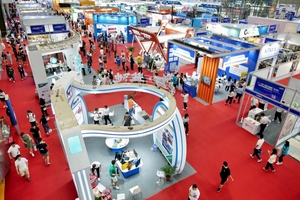China’s Cross-Border Ecommerce Platforms Try to Lure More Sellers With Better Terms
Listen to the full version

China’s major cross-border e-commerce players have been rolling out a new business model that could help merchants deliver goods faster and boost sales, as the platforms explore ways to attract more international suppliers amid greater regulatory scrutiny and fierce competition.
Alibaba Group Holding Ltd.’s global unit AliExpress in January officially launched its version of the so-called “semi-consignment” model, which allows merchants to delegate logistics to the platform while having a greater say in product pricing and operations. PDD Holdings Inc.’s Temu launched a similar service in the U.S. in March and fast-fashion retailer Shein in May.

Download our app to receive breaking news alerts and read the news on the go.
Get our weekly free Must-Read newsletter.
- DIGEST HUB
- China’s major e-commerce players, including Alibaba’s AliExpress, PDD Holdings’ Temu, and Shein, introduced a "semi-consignment" business model to enhance logistics and sales.
- The semi-consignment model allows merchants more control over pricing and quicker delivery by using overseas inventory, compared to the full-consignment model.
- This new model diversifies services and helps platforms respond to increased regulatory scrutiny, especially regarding U.S. air freight and de minimis rules.
China's major cross-border e-commerce players, such as Alibaba's AliExpress, PDD Holdings' Temu, and fast-fashion retailer Shein, have introduced a semi-consignment model to help merchants deliver goods faster and boost sales. This model allows merchants to delegate logistics to the platform while retaining more control over product pricing and operations. Each platform's version of the model differs slightly, with Shein and Temu targeting merchants with overseas inventory to ensure faster order fulfillment and to enable the sale of larger items that were previously limited due to air freight constraints[para. 1][para. 2][para. 3].
This novel business model emerged as part of a global trend towards offering merchants lower-cost selling opportunities without the burden of logistics. It contrasts with the traditional full-consignment model, where platforms manage almost all aspects of the selling process, including pricing, marketing, processing orders, delivery, and after-sales services. While the full-consignment model requires vendors to transport products to designated warehouses in China, it affords them less autonomy and results in longer delivery times for bulky items[para. 4][para. 5][para. 6].
The semi-consignment model, however, allows e-commerce platforms to diversify services, expand product offerings, and improve logistical efficiency, according to Li Mingtao, chief e-commerce researcher at the China International Electronic Commerce Center. Moreover, this model addresses increasing regulatory scrutiny, particularly in the U.S., where there is significant concern over the exploitation of the "de minimis" rule that allows duty-free imports for goods valued at $800 or less[para. 8][para. 9][para. 10].
In response to this scrutiny, the U.S. Department of Homeland Security announced measures to tighten the inspection of small package shipments to prevent illicit goods from entering the market under de minimis exemptions. To mitigate such risks, Temu has expanded its semi-consignment business from the U.S. to several other countries, including Canada, the U.K., Australia, New Zealand, and parts of the European Union, with further expansion planned for Japan and South Korea[para. 11].
Under the semi-consignment model, merchants can reduce the risk of backlog in overseas warehouses. Pricing under this model is often more profitable as it is benchmarked against higher-priced platforms like Amazon, unlike the full-consignment model, which references lower-priced Chinese platforms. Consequently, many merchants operating on Amazon are also using the semi-consignment model, while others remain cautious, adopting a wait-and-see approach. One Amazon seller has even started using both full and semi-consignment models offered by Temu and Shein to diversify their platform dependency[para. 12][para. 13].
On the other hand, Southeast-Asia-focused e-commerce platforms such as Shopee and Alibaba-owned Lazada, and U.S. marketplace Wish, still rely on the full-consignment model. A Shopee representative mentioned that the platform is currently assessing product popularity in various markets before potentially adopting a semi-consignment model[para. 14].
In summary, the shift towards the semi-consignment model by major Chinese e-commerce players represents an effort to enhance logistical efficiency, mitigate regulatory risks, and provide more profitable and flexible options for merchants. It is a strategic response to evolving market dynamics and regulatory landscapes in cross-border e-commerce[para. 1][para. 2][para. 3][para. 4][para. 5][para. 6][para. 8][para. 9][para. 10][para. 11].
- Alibaba Group Holding Ltd.
- Alibaba Group Holding Ltd.’s global unit, AliExpress, officially launched its semi-consignment model in January. This model allows merchants to delegate logistics to AliExpress while retaining control over product pricing and operations. AliExpress aims to attract more international suppliers and improve logistics efficiency. Unlike full-consignment, this model offers faster delivery and better pricing power for merchants.
- PDD Holdings Inc.
- PDD Holdings Inc.’s platform, Temu, launched its semi-consignment model in the U.S. in March. This model allows merchants to delegate logistics to the platform while retaining more control over pricing and operations, enabling faster order fulfillment and selling larger items. Temu is expanding this service to Canada, the U.K., Australia, New Zealand, and some European Union countries, and plans to launch in Japan and South Korea soon.
- Shein
- Shein launched its semi-consignment model in May, allowing merchants to store inventory overseas for faster delivery of large items and giving them more pricing power compared to Temu. The model aids in diversifying services, enhancing logistics efficiency, and responding to overseas regulatory scrutiny.
- Shopee
- Shopee, a Southeast Asia-focused e-commerce platform, is still using the full-consignment model. The company is currently exploring the popularity of different products in various markets before considering a shift to the semi-consignment model.
- Lazada
- Lazada, an e-commerce platform owned by Alibaba, is currently focused on using the full-consignment model, similar to Shopee and Wish. They have not yet adopted the semi-consignment model but are exploring the popularity of different products in various markets before considering such a change.
- Wish
- Wish, a U.S. marketplace, is still focused on the full-consignment model for its e-commerce operations. Unlike platforms such as Temu and Shein, Wish has not yet adopted the semi-consignment model.
- Before April 2024:
- At a forum in Shenzhen, a Temu employee in charge of attracting new merchants said the platform is focusing on its semi-consignment business, which has expanded from the U.S. to Canada, the U.K., Australia, New Zealand, and some European Union countries. It will soon launch in Japan and South Korea.
- January 2024:
- Alibaba Group Holding Ltd.'s global unit AliExpress officially launched its version of the semi-consignment model.
- March 2024:
- PDD Holdings Inc.'s Temu launched a similar semi-consignment service in the U.S.
- April 2024:
- The Department of Homeland Security announced a crackdown on small package shipments to prohibit illicit goods from entering the U.S. market.
- May 2024:
- Fast-fashion retailer Shein launched its semi-consignment service.
- GALLERY
- PODCAST
- MOST POPULAR







 Sign in with Google
Sign in with Google
 Sign in with Facebook
Sign in with Facebook
 Sign in with 财新
Sign in with 财新